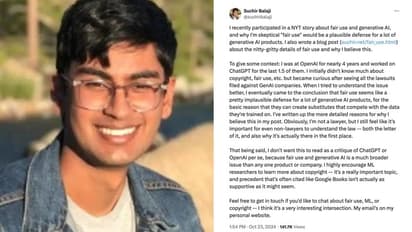OpenAI whistleblower Suchir Balaji's final X post on AI and copyright goes viral after sudden death; read here

Synopsis
Suchir Balaji, a 26-year-old former OpenAI employee and vocal critic of generative AI's legal and ethical challenges, died by suicide in his San Francisco apartment on November 26, authorities confirmed.
Suchir Balaji, a 26-year-old former OpenAI employee and vocal critic of generative AI's legal and ethical challenges, died by suicide in his San Francisco apartment on November 26, authorities confirmed.
Balaji, an Indian-origin computer scientist, was widely known for his contributions to artificial intelligence during his four-year tenure at OpenAI, where he worked on the groundbreaking ChatGPT for 1.5 years. However, in recent months, he gained attention for his outspoken views on the implications of generative AI, particularly around copyright law and fair use.
Suchir Balaji's final post on X goes viral
In a poignant post on X (formerly Twitter) dated October 24, Balaji shared his skepticism about the legal viability of "fair use" as a defense for many generative AI models. He argued that these models, including ChatGPT, often produce outputs that compete with the data on which they are trained, raising questions about their legality and ethical foundations.
"I recently participated in a NYT story about fair use and generative AI, and why I'm skeptical "fair use" would be a plausible defense for a lot of generative AI products. I also wrote a blog post (https://suchir.net/fair_use.html) about the nitty-gritty details of fair use and why I believe this," he said in his last X post dated October 24.
"To give some context: I was at OpenAI for nearly 4 years and worked on ChatGPT for the last 1.5 of them. I initially didn't know much about copyright, fair use, etc. but became curious after seeing all the lawsuits filed against GenAI companies. When I tried to understand the issue better, I eventually came to the conclusion that fair use seems like a pretty implausible defense for a lot of generative AI products, for the basic reason that they can create substitutes that compete with the data they're trained on. I've written up the more detailed reasons for why I believe this in my post. Obviously, I'm not a lawyer, but I still feel like it's important for even non-lawyers to understand the law -- both the letter of it, and also why it's actually there in the first place," Balaji added.
"That being said, I don't want this to read as a critique of ChatGPT or OpenAI per se, because fair use and generative AI is a much broader issue than any one product or company. I highly encourage ML researchers to learn more about copyright -- it's a really important topic, and precedent that's often cited like Google Books isn't actually as supportive as it might seem," he further wrote.
"Feel free to get in touch if you'd like to chat about fair use, ML, or copyright -- I think it's a very interesting intersection. My email's on my personal website," he concluded.
When Suchir Balaji criticized OpenAI
Balaji’s death occurred three months after he publicly accused OpenAI of violating US copyright law in the development of ChatGPT, a generative AI program that has become a global sensation, attracting hundreds of millions of users.
ChatGPT, which was released publicly in late 2022, has faced a wave of lawsuits from authors, programmers, and journalists who allege that OpenAI unlawfully used their copyrighted material to train the model, boosting its value to over $150 billion.
In an interview with The New York Times published on October 23, Balaji criticized OpenAI, arguing that the company’s practices were harming businesses and entrepreneurs whose data was used to train ChatGPT.
Balaji ultimately chose to leave OpenAI, stating that he could no longer support the development of technologies that he believed posed more harm than benefit to society.
“If you believe what I believe, you have to just leave the company,” he told the outlet, adding that “this is not a sustainable model for the internet ecosystem as a whole.”
Balaji, who grew up in Cupertino, California, pursued his passion for technology by studying computer science at UC Berkeley.
In the wake of his passing, Balaji’s mother has requested privacy as she mourns the loss of her son, according to The Mercury News.
Check the Breaking News Today and Latest News from across India and around the world. Stay updated with the latest World News and global developments from politics to economy and current affairs. Get in-depth coverage of China News, Europe News, Pakistan News, and South Asia News, along with top headlines from the UK and US. Follow expert analysis, international trends, and breaking updates from around the globe. Download the Asianet News Official App from the Android Play Store and iPhone App Store for accurate and timely news updates anytime, anywhere.